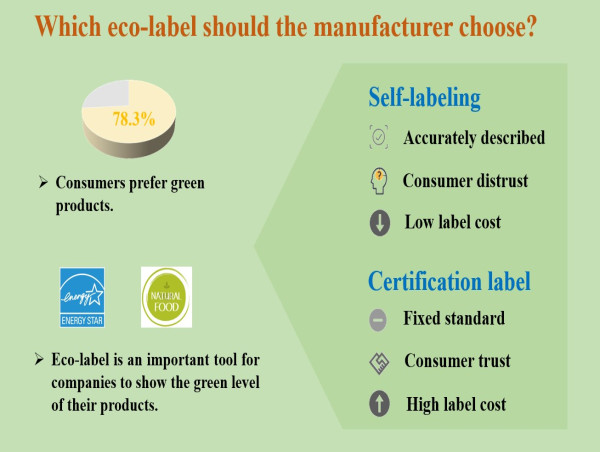USA, March 12, 2024 /EINPresswire.com/ -- Researchers use game theory to analyze the eco-label strategy selection of the manufacturer in green supply chain. The results indicate that self-labeling is more favored by the manufacturer, although social welfare may be lower, while certification label is more favored by the supplier. Under lower consumer trust and green investment, multi-level certification labels may also become the preferred choice for the manufacturer. Besides, consumer preferences for green products may harm the company's profits.
The green lifestyle has been increasingly popular in recent years. According to the 2023 China Consumption Trend Report, 73.8% of customers prioritize buying environmentally friendly products. Tools such as eco-labels are widely used by companies to show consumers how green their products are.
Eco-label comes in the form of certification label or self-labeling, depending on the originator. Certification label is issued by third-party certification bodies, such as Energy Star and Organic Food. While they are trusted by consumers, it is difficult to convey green attributes beyond the standard to consumers. Self-labeling, such as Wal-Mart's natural label, is the manufacturer's self-declaration of the product's green status on the packaging, but consumers often have low trust in it.
In this context (doi: https://doi.org/10.1016/j.susoc.2023.12.003), a research team led by Professor Gaoxiang Lou of East China University of Science and Technology and Professor Yi-Ming Wei of Beijing Institute of Technology constructed a green supply chain game model which includes a manufacturer and a supplier. The supplier provides green raw materials, and the manufacturer carries out green manufacturing and chooses eco-label for products.
The researchers found that upstream and downstream companies in the supply chain have conflicting eco-label selection preferences. The supplier prefers certification label, while the manufacturer tends to choose self-labeling, although the social welfare under certification label may be higher. According to this discovery, further coordination among supply chain members is needed to address conflicting preferences.
Further, the researchers expanded the certification label level from the original single level to multiple levels. For example, Cradle to Cradle Certified is divided into five levels. The results indicate that when consumers have low trust in self-labeling and the difficulty of green investment is low, the manufacturer is more likely to choose multi-level certification labels. This gives a scientific basis for the formulation of multi-level eco-label.
Besides, the researchers found an interesting result - when companies adopt single-level certification label, consumers' green preferences can be harmful to companies’ profitability. They explained, "As consumers' green preferences increase, certification agencies will issue more strict certification standards. This will force companies to invest more in green innovation, thereby damaging their profitability."
Finally, the researchers, who published their findings in the KeAi journal Sustainable Operations and Computers, stated, "We simultaneously consider green supplying, green manufacturing, and eco-label selection behaviors in the green supply chain, and further extend to multi-level eco-label, which is rare in existing research". Their results can provide reference for the green innovation practice and eco-label strategy selection in green supply chain.
DOI
10.1016/j.susoc.2023.12.003
Original Source URL
https://doi.org/10.1016/j.susoc.2023.12.003
Funding information
This research was provided by the National Natural Science Foundation of China (No. 71972070) and the Fundamental Research Funds for the Central Universities.
Lucy Wang
BioDesign Research
email us here
![]()



